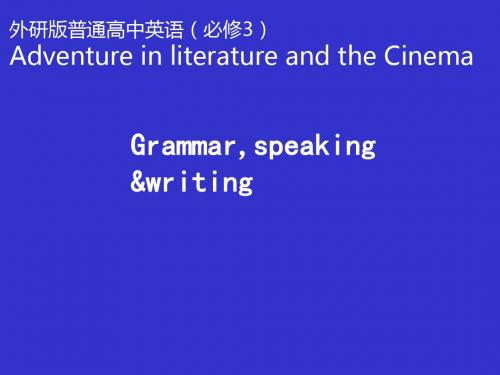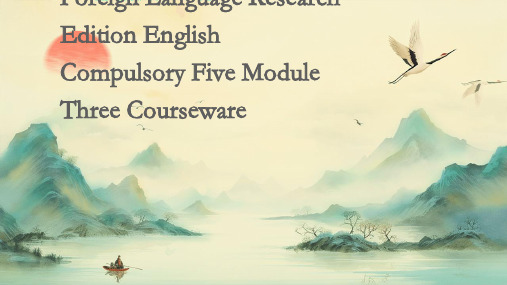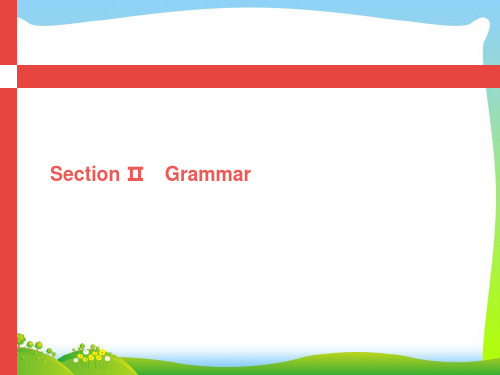外研版高中英语必修五教学课件:unit 3 Period 3
合集下载
外研版高中英语 必修五 Module3 Grammar,speaking and writing公开课教学课件共24张PPT

My favourite part of the
film is that Rose gave
up the chance of _s_u_r_v_iv_i_n_gand stayed
with Jack waiting for the d_e__a_th_ coming. It is
a veryt_o_u_c_h__in_g_ film, a must-see.
Explain the function
1.The news was very disappointing.
Everyone was disappointed at the news. Used as predicative(表语) 2.It was a very tiring journey.
Those tired horses and soldiers refused to fight any longer. Used as attibutive(定语) 3.The man standing on the stage is a professor.
2. Used as attibutive(定语)
• V-ing: to make people feel
V-ed: to feel
frightening look frightened look
3.V-ed to express passive(被动)
V-ing to express active(主动)
被遗弃的农场
一个哭泣的孩子
a_b_a__n_d_o_n__e_d farms a _c_r_y_in__g_ boy
Correct the mistakes
• 1. Last week, I went to see a movie, which was very touched.
film is that Rose gave
up the chance of _s_u_r_v_iv_i_n_gand stayed
with Jack waiting for the d_e__a_th_ coming. It is
a veryt_o_u_c_h__in_g_ film, a must-see.
Explain the function
1.The news was very disappointing.
Everyone was disappointed at the news. Used as predicative(表语) 2.It was a very tiring journey.
Those tired horses and soldiers refused to fight any longer. Used as attibutive(定语) 3.The man standing on the stage is a professor.
2. Used as attibutive(定语)
• V-ing: to make people feel
V-ed: to feel
frightening look frightened look
3.V-ed to express passive(被动)
V-ing to express active(主动)
被遗弃的农场
一个哭泣的孩子
a_b_a__n_d_o_n__e_d farms a _c_r_y_in__g_ boy
Correct the mistakes
• 1. Last week, I went to see a movie, which was very touched.
外研版高中英语必修五教学课件:unit+3+Period+2

students’ work.
(
)
【答案】(1)动词。说明 (2)名词。说明;解释
account for 解释;说明
(1)
this(that) account 由于这(那)个缘故
take account (2)
考虑到;顾及
take ...(3)
account 把……考虑在内
on no account 决不
Period 2
Language Study
1.理解并能够自主运用重要语言点,如 account, lie, curious,
determined,run away 等单词和短语的用法。
2.积累语言学习的技巧,形成适合自己的语言学习策略。
1.在具体语境中掌握词汇的基本含义、词性及基本用法。
2.识记部分重点单词或短语的外延含义,注意熟词生义现象。
vt. 创造;创作
vt. 与……相似
adj. 生动的;逼真的
n. 除外;例外
adj. 坚决的
vt. 确立;确定;建立
n.名誉;名望
二、短语快记
1.run
逃跑
2.have
with 与……有联系
3.to one’s
令某人吃惊的是
4.die
fright 死于恐惧
5.set
出发;动身
6.make
编造
7.make one’s
was dangerous.
2.From his
(determine) look, we can know his
confidence.
3.This was, by far, the most
(terrify) event of my
(
)
【答案】(1)动词。说明 (2)名词。说明;解释
account for 解释;说明
(1)
this(that) account 由于这(那)个缘故
take account (2)
考虑到;顾及
take ...(3)
account 把……考虑在内
on no account 决不
Period 2
Language Study
1.理解并能够自主运用重要语言点,如 account, lie, curious,
determined,run away 等单词和短语的用法。
2.积累语言学习的技巧,形成适合自己的语言学习策略。
1.在具体语境中掌握词汇的基本含义、词性及基本用法。
2.识记部分重点单词或短语的外延含义,注意熟词生义现象。
vt. 创造;创作
vt. 与……相似
adj. 生动的;逼真的
n. 除外;例外
adj. 坚决的
vt. 确立;确定;建立
n.名誉;名望
二、短语快记
1.run
逃跑
2.have
with 与……有联系
3.to one’s
令某人吃惊的是
4.die
fright 死于恐惧
5.set
出发;动身
6.make
编造
7.make one’s
was dangerous.
2.From his
(determine) look, we can know his
confidence.
3.This was, by far, the most
(terrify) event of my
外研版英语必修五模块三课件

Grammar knowledge
Understanding complex grammar
Learners should be able to understand and apply more complex grammatical structures, such as subjunctive mood, non finite verbs, etc., to improve the accuracy and richness of language expression.
Background
The module provides an overview of the development of film and television in English speaking countries, as well as the impact of these media on world culture
01
Import
Theme introduction
Theme
The theme of this module is "Exploring the World of English through Film and Television" It aims to introduce students to the rich cultural and historicg countries through the lens of film and television
Students will improve their English listening, speaking, reading, and writing skills through interactive and engaging activities
外研版高中英语必修五课件:Module+3+Reading+%26+vocabulary.ppt

The police are interviewing two men in connection with the robbery. 警方正在查问与劫案有关的两个人。
3. identify v. 识别、认出、辨别 (身份, 物体) identify the criminal 认出罪犯
e.g. I can identify that watch as mine by the scratches on the back. His accent was difficult to identify. She identified the man as her attacker.
Language points
1. fantasy n. 想象, 幻想 live in a fantasy world 生活在幻想世界里 fantastic adj. 了不起的,极好的 You passed your test? Fantastic! 你测验及格了? 太棒了!
2. have connection with 和……有关系 in connection with 关于, 有关, 和…有关 be connected with 与……有联系, 有关 His dismissal has no connection with the quality of his work. 他被解雇一事与他工作好坏无关。
reality
_f_a_n_t_a_sy___
3. a story in which there is lots of action
_a_d_v_e_n_tu__re_
4. an extremely exciting story, which is
often frightening
3. identify v. 识别、认出、辨别 (身份, 物体) identify the criminal 认出罪犯
e.g. I can identify that watch as mine by the scratches on the back. His accent was difficult to identify. She identified the man as her attacker.
Language points
1. fantasy n. 想象, 幻想 live in a fantasy world 生活在幻想世界里 fantastic adj. 了不起的,极好的 You passed your test? Fantastic! 你测验及格了? 太棒了!
2. have connection with 和……有关系 in connection with 关于, 有关, 和…有关 be connected with 与……有联系, 有关 His dismissal has no connection with the quality of his work. 他被解雇一事与他工作好坏无关。
reality
_f_a_n_t_a_sy___
3. a story in which there is lots of action
_a_d_v_e_n_tu__re_
4. an extremely exciting story, which is
often frightening
外研版高中英语必修五教学课件:unit+1+Period+3.ppt

做作业。
2.表示主语现在的特征、性格和状态。
The dictionary (1)
to me.这本词典是我的。
3.表示客观规律、正确的事实或科学真理、格言,以及其他不受
时间限制的客观存在。
The moon goes around the earth.月亮绕着地球转。
4.在由 when, if, after, before, as soon as, even if, in case,
4.She
(live) in Beijing since we last saw each
other.
5.The plane
(leave) at 7:00 pm, so I have to be at
the airport by 6:40 at the latest.
【答案】1.carries 2.is developing 3.will help 4.has lived 5.leaves
4.常与介词 for,during,in,within,over 等引导的时间状语连
用,表示过去的某一行为一直延续到现在。
I (2)
my English teacher in the recent years.近
几年我没见过我的英语老师。
5. 表 示 反 复 或 习 惯 性 的 动 作 , 常 与 several
动词的时态
一、一般现在时
1.表示现在习惯或经常反复发生的动作或存在的状态 ,常与
usually,always,sometimes,often,frequently,every day /
week / year / morning...on Sundays 等时间状语连用。
外研版高中英语必修五课件:Module+4+第四单元

课时分配
课时
板块结合范例
Period 1 Introduction + Reading and Vocabulary
Period 2 Period 3 Period 4
Grammar
Listening and Vocabulary + Function +Everyday English
Reading and writing+ Culture corner
Period 1
Module 4 Carnival
Introduction +Reading and Vocabulary
Introduction – 1. Guessing (3m) Guess the festivals with the descriptions.
1. This is a Christian festival which comes form the middle of the winter.
revived? And by whom? 7. Is the spirit of Venice carnival the same as the great
American carnivals?
Reading & Vocabulary –2 . Detailed-reading
Key to the answers:
Things you may do
eat especial food. give or receive gifts wear special clothes. dance and listen to music. have a holiday from school. take part in a traditional ceremony. enjoy yourself with friends or family.
课时
板块结合范例
Period 1 Introduction + Reading and Vocabulary
Period 2 Period 3 Period 4
Grammar
Listening and Vocabulary + Function +Everyday English
Reading and writing+ Culture corner
Period 1
Module 4 Carnival
Introduction +Reading and Vocabulary
Introduction – 1. Guessing (3m) Guess the festivals with the descriptions.
1. This is a Christian festival which comes form the middle of the winter.
revived? And by whom? 7. Is the spirit of Venice carnival the same as the great
American carnivals?
Reading & Vocabulary –2 . Detailed-reading
Key to the answers:
Things you may do
eat especial food. give or receive gifts wear special clothes. dance and listen to music. have a holiday from school. take part in a traditional ceremony. enjoy yourself with friends or family.
高中英语外研版必修五课件:第三单元+Adventure+in+Literature+and+CinemaPeriod+Three Grammar+Writing

一般式 完成式 一般式
doing having done
being done having been done /
done
Ⅰ.不定式作宾语、宾语补足语 一、不定式作宾语 1.能用不定式作宾语的动词常见的有:want,hope,wish,offer,fail,plan, learn , pretend , refuse , manage , help , agree , promise , prefer , warn , request等。 She pretended not to see me when I came in. 当我进来时,她假装没有看见我。
remember doing sth.记得已经做了某事 remember to do sth.记住要做某事 try doing sth.尝试着做某事 try to do sth.企图、尽力做某事 mean doing sth.意味着做某事 mean to do sth.打算做某事 can’t help doing sth.禁不住做某事 can’t help to do sth.不能帮助做某事 regret doing sth.后悔做了某事 regret to do sth.因要做某事而遗憾
Period Three——
栏目 索引
语法专题 写作专题
复习动词(Ⅲ)——非谓语动词 写一篇影评
语法专题
复习动词(Ⅲ)——非谓语动词
语法精析
非谓语动词是动词的非谓语形式。它们不能在句中充当谓语,可充当其 他语法功能,可以起名词、形容词或副词的作用,在句子中充当主语、 宾语、表语、定语、补语和状语。非谓语动词包括:动词不定式、动词 的-ing形式和动词的-ed形式三种。
外研版英语必修五课件:Module+3+Section+Ⅱ Grammar.ppt

ⅠⅡⅢ
7.听到这话后,那个在地上已被吓傻的人开始哭起来。
8.我得设法救他!
9.但我说服他帮我,我们找到了他们拴在汽船另一边的小船。
10.但现在我开始后悔这么做了。
7.When he heard that,the frightened man on the floor started crying. 8.I have to find a way to save him! 9.But I persuaded him to help me,and we found the men’s boat tied to the other side of the steamboat. 10.But now I began to feel bad about what we had done.
deeds.
3.I listened to the wind, thinking (think) that he would not
come tonight.
4.As a result of my laziness,I failed to finish
(finish)my
work on time.
ⅠⅡⅢ
written (write) on the blackboard. 9. Given (give) such a chance,why don’t you have a try? 10.I am tired and I don’t feel like walking (walk) any further.
ⅠⅡⅢ
剖析:以上句中黑体词为系动词,其中第1、6句中用 be动词 , 第2、3、4、5句中用 感官动词 。
ⅠⅡⅢ
Ⅲ.用动词的适当形式填空
- 1、下载文档前请自行甄别文档内容的完整性,平台不提供额外的编辑、内容补充、找答案等附加服务。
- 2、"仅部分预览"的文档,不可在线预览部分如存在完整性等问题,可反馈申请退款(可完整预览的文档不适用该条件!)。
- 3、如文档侵犯您的权益,请联系客服反馈,我们会尽快为您处理(人工客服工作时间:9:00-18:30)。
【答案】 1.to sell 5.to help
2.wearing
3.blown
4.exciting
动词不定式及现在分词与过去分词的用法 一、动词不定式 动词不定式由“to +动词原形”构成。这里的 to 是不定式标志, 无意义。不定式具有名词、形容词或副词的某些语法功能。常见 的动词不定式的语态形式如下表所示(以及物动词 do 为例)。 (注 意:不及物动词没有被动语态)
时态/语态 主动 被动 一般式 to do to be done 进行式 to be doing —— 完成式 to have done to haveoing—— 1.不定式作主语 不定式作主语时,常用 it 作形式主语,真正的主语不定式放在句 子的后面。 To love and to be loved is the greatest happiness in the world .爱与被爱是世界上最大的幸福。
5.“to be +形容词”作宾语补足语 此类结构常用在 find, think, consider, believe, suppose, know, understand 等词后。 They found the answer (4) quite satisfying.他们 发现这个答案很令人满意。 6.有些动词或动词短语后面既可以接 v-ing 作宾语,也可以接不 定式,但意义有所不同。 如 remember, forget, stop, try, regret, want, need, mean... They regretted ordering these books from abroad.他们很后 悔从国外定购了这些书。 I regret to say that we can’t stay here any longer.我很 抱歉(地告诉你),我们不能再在这儿多待了。
3.The trees (blow) down in the storm have been moved. 4.He was very happy to hear the (excite) news. 5.Most of the people are willing (help) those in trouble.
Period 3
Grammar
1.复习非谓语动词用法。 2.了解三种不同非谓语动词的区别,并能在具体语境中加以运用。 1.学会区分三种非谓语动词。 2.熟练掌握非谓语动词的用法。
重点语法 动词不定式及现在分词与过去分词的用法
单句填空 1.Since the plants took a while to grow, he started cutting down trees (sell) the wood. 2.Mary will never forget the first time she saw him. He suddenly appeared in class one day, (wear) a pair of sunglasses.
使役动词 let, have, make 后;感官动词 see, watch, look at, notice, observe, hear, listen to, smell, feel, find 等 后;但在被动语态中要加上 to; but 和 except 后,如果 but 前是 实义动词 do 时,后面出现的不定式不带 to;若 but / except 前没 有出现动词 do,则其后的不定式通常带 to;would rather, had better 句型后面出现的不定式不带 to;由 and, or 和 than 连接 的两个不定式,第二个 to 可以省去。 I would rather sleep than (3) this movie. 我情愿 睡觉也不愿看这部电影。 A thief was seen to slip into the shop. 一个小偷被看见溜 进了商店。 He wants to do nothing but go out. 他什么事都不想干,只想 出去。
It’s necessary for you (1) the car when you do not use it.在你不用车的时候,锁车是有必要的。 2.不定式作宾语 有些动词,如 afford, aim, agree, desire, care, determine, demand, fail, long, offer, pretend, undertake 等后常接不 定式作宾语。 He offered to lend me a hand. 他主动向我伸出援手。 (2016·上海)More recently, the Paris Agreement, struck by nearly 200 countries, also aims (2) global warming. 最近,由近 200 个国家签署的《巴黎协定 》也是旨在限制全球 变暖。
3.不定式作状语 不定式常用作目的状语,常用结构为 to do, only to do, in order to do, so as to do, so (such)... as to...。作结果状语时, 表示没有预料到的或事与愿违的结果;还可表原因或者条件。 (2016·北京 )To make it easier to get in touch with us, you’d better keep this card at hand. 为了更方便地联系到 我们,你最好随身带着这张卡片。 He ran so fast as to catch the first bus. 他飞快地跑以便 赶上第一班公交车。 She wept to see the sight.她一看到这情形就哭了。 He must be a fool to say so.他这样说,真是个傻子。 4.省去 to 的动词不定式
